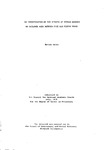AN INVESTIGATION OF THE EFFECTS OF FATHER ABSENCE ON CHILDREN AGED BETWEEN FIVE AND ELEVEN YEARS
| dc.contributor.author | Hayes, Monica | |
| dc.contributor.other | School of Psychology | en_US |
| dc.date.accessioned | 2013-09-25T08:45:48Z | |
| dc.date.available | 2013-09-25T08:45:48Z | |
| dc.date.issued | 1978 | |
| dc.identifier | NOT AVAILABLE | en_US |
| dc.identifier.uri | http://hdl.handle.net/10026.1/1950 | |
| dc.description.abstract |
The effects of permanent and intermittent father absence on the cognitive development and the emotional and behavioural problems of children aged between 5 and 11 years were examined. There were two investigations. In the first of these 53 children aged between 5 and 7 years were studied. In the second investigation there were two samples, one of 52 children aged between 5 and 7 years and the other of 54 children aged between 8 and 11 years. The samples were drawn randomly from the population of a city. Middle class and working class male and female children were included. All children had either one or two siblings. Those whose fathers were permanently away because of parental divorce and those whose fathers were away intermittently because of occupational demands were compared with children whose fathers were never away from home. The results o f the investigations indicated that absence of the father, whether permanent or intermittent, had no effect on the cognitive development of the children assessed by the WISC. Both teachers' and mothers’ reports showed that permanent absence of the father was associated with an increased incidence of emotional and behavioural problems in children aged between 5 and 7 years and children aged between 8 and 11 years. Middle class boys and working class girls were found to be particularly affected. Intermittent absence of the father was found to be related to a higher incidence of problems only in mothers' reports of children aged between 5 and 7 years and the effect was not as clear as that observed in the permanent absence group. The explanation that father absence itself, or a consistent pattern of environmental circumstances associated with that absence, caused the increased incidence of emotional and behavioural problems in the children was rejected. An alternative was proposed in which absence of the father and the circumstances accompanying such absence were considered as specific events among many that might, but would not necessarily increase the environmental stress experienced by the children. Only when the cumulative stress experienced by an individual child reached a level, which for him or her was critical, would emotional and behavioural problems appear. | |
| dc.language.iso | en | en_US |
| dc.publisher | University of Plymouth | en_US |
| dc.title | AN INVESTIGATION OF THE EFFECTS OF FATHER ABSENCE ON CHILDREN AGED BETWEEN FIVE AND ELEVEN YEARS | en_US |
| dc.type | Thesis | |
| plymouth.version | Full version | en_US |
| dc.identifier.doi | http://dx.doi.org/10.24382/3538 | |
| dc.identifier.doi | http://dx.doi.org/10.24382/3538 |
Files in this item
This item appears in the following Collection(s)
-
01 Research Theses Main Collection
Research Theses Main


